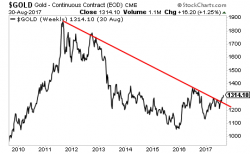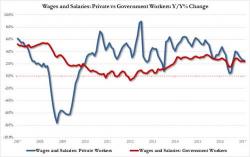Gold Breaks Out!

The US Dollar collapse has already triggered a major move in inflation plays.
To whit, Gold has broken its SEVEN-YEAR downtrend.
As the US Dollar continues to drop hard over the next 12 months, Gold and other inflation plays will be exploding higher.
Below is a chart of an inverted US Dollar (blue line) and Gold prices (black line). As you can see, Gold is now leading. And as the US Dollar drops, Gold will be roaring even higher.
Smart investors will use this trend to make literal fortunes.
